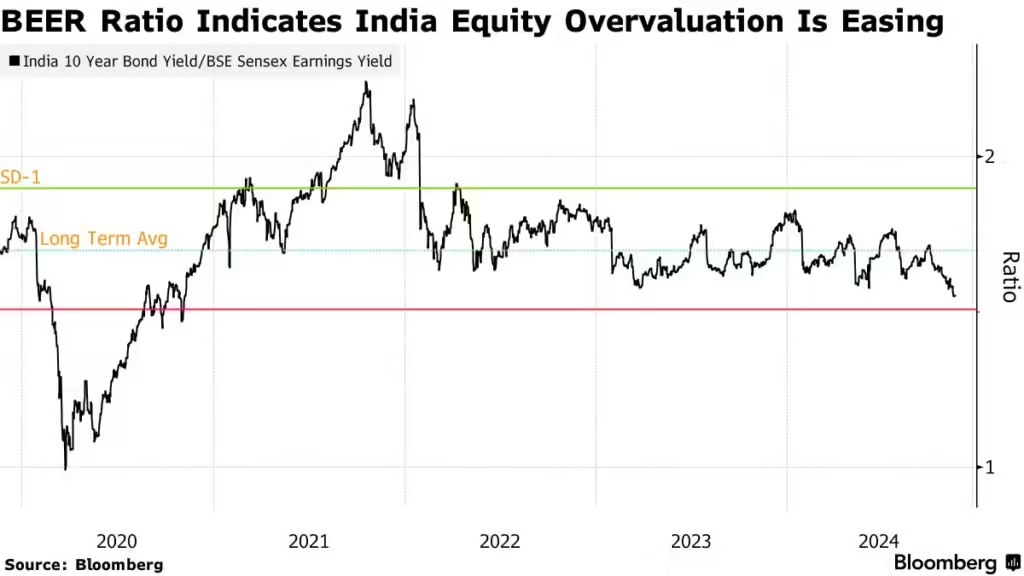Indian equities face pressure as the BEER ratio drops to 1.3x, nearing a one-standard-deviation level for the first time since 2020. FIIs sold ₹34,350 crore in November, reflecting global caution.
The Maharashtra election is pivotal, as it could influence economic policies. A loss for the BJP-led alliance might lead to increased populist measures, including reduced infrastructure spending, which has been a cornerstone of Modi’s growth-focused strategy. On the other hand, even a BJP victory may not immediately reverse the bearish trends, as global market conditions and corporate earnings continue to weigh on investor sentiment.
Modi Stocks Struggle Amid Political and Market Uncertainty
Stocks tied to Prime Minister Narendra Modi’s economic agenda, commonly referred to as “Modi stocks,” have witnessed a sharp decline in performance in 2024. An index tracking these equities has recorded a modest 4% gain so far this year, a significant drop from the over 30% rally observed earlier. The underperformance is attributed to multiple factors, including the ongoing Maharashtra state election and a broader bearish sentiment in equity markets.
The sluggish performance of these stocks highlights market volatility linked to political developments. Historically, elections in key states like Maharashtra have had a notable impact on investor confidence. The state contributes nearly 15% of India’s GDP, making its political landscape crucial for policy continuity and investor expectations.
Broader market concerns further exacerbate the challenges. Foreign Institutional Investors (FIIs) have been net sellers, offloading over ₹34,500 crore worth of Indian equities in November 2024. Weak corporate earnings in key sectors, including technology and manufacturing, have failed to justify high valuations, contributing to the pessimistic market outlook.
Rising Gas Prices to Impact Urban Consumers and Distribution Margins
The recent reduction in the allocation of cheaper natural gas to city gas distribution companies is set to have a significant ripple effect on urban households. Gas distribution firms will now have to procure more expensive supplies from the open market, likely resulting in increased utility bills for urban consumers already grappling with inflationary pressures. This shift might lead to a notable rise in gas prices for end-users.
Currently, the government allocates approximately 85% of the cheaper domestic gas supply to city gas distributors. However, with this allocation cut to 75%, distribution companies must rely more on imported liquefied natural gas (LNG), which is priced significantly higher at $14-$15 per million British thermal units (MMBtu), compared to the domestic gas price of $6.5 per MMBtu.
Urban households could see gas bills increase by 10%-15% in the coming months. For example, a household paying ₹1,200 monthly for piped natural gas (PNG) might see their bill rise to ₹1,380–₹1,400. This rise in costs is likely to affect discretionary spending on other goods and services, compounding challenges in an already strained urban consumption landscape.
From a corporate perspective, higher gas prices could weigh heavily on city gas distribution companies like Indraprastha Gas Ltd. (IGL), Mahanagar Gas Ltd. (MGL), and Gujarat Gas Ltd., which derive a significant portion of revenue from urban markets. Citigroup and Morgan Stanley analysts project a potential 5%-8% margin contraction for these firms due to increased procurement costs. For instance, IGL, which recorded an operating profit margin of 28% last quarter, could see this figure fall to 20%-22% if costs continue to rise.
Smaller Stocks Under Pressure Amid Earnings Downgrades
The mid-cap and small-cap stock segments are underperforming, mirroring the broader market’s downturn but facing steeper earnings downgrades. As per September Quarter Earnings, 77% of mid-cap and 64% of small-cap companies have had their earnings reduced, compared to 61% for large caps. This highlights a sharper contraction in smaller stocks relative to their larger peers.
The mid-cap index, down approximately 7% in the past three months, has struggled alongside the small-cap index, which has fallen nearly 8% over the same period. In comparison, the Nifty 50 Index has declined by about 5%. These numbers underscore that while all market segments face pressure, smaller stocks are hit disproportionately hard, primarily due to their higher valuations relative to fundamentals.
For instance, the price-to-earnings (P/E) ratio for the small-cap index currently stands at 35x, while the mid-cap index trades at 29x—substantially higher than the Nifty 50’s P/E of 23x. Such elevated valuations leave smaller companies more vulnerable to corrections amid earnings downgrades and a challenging macroeconomic environment.
Read more: Will Nifty Hold Gains Above 24,500?
Sector-specific impacts are evident. Small-cap IT firms have faced revenue slowdowns, with companies like Persistent Systems and KPIT Technologies seeing 15%-20% cuts in their FY24 earnings projections. Similarly, mid-cap manufacturers in capital goods and real estate-related industries are grappling with weak order inflows and rising input costs, leading to lowered profit expectations.
Caution should be exercised while dealing in the mid-cap and small-cap segments. Instead, consider high-quality companies with proven track records of consistent earnings growth and strong balance sheets.
Despite their recent corrections, mid-cap and small-cap stocks are still trading at premiums compared to historical averages. As a result, there may be further downside, especially if global macroeconomic concerns, such as rising interest rates and geopolitical tensions, persist.
Valuations Ease Amid Extended Market Selloff
Indian equities are becoming more reasonably priced as the ongoing selloff extends into its eighth week. The BEER ratio, which compares the earnings yields of the BSE Sensex to the 10-year government bond yields, has fallen below its long-term average of 1.5x. Currently, it hovers near 1.3x and is approaching the one-standard-deviation level for the first time since 2020. This suggests a rebalancing of equity valuations with market fundamentals.

While equity earnings yields are at 4.2%, government bond yields have risen to 7.3%, tightening the gap that previously favored stocks. In October, when the BEER ratio was closer to 1.7x, equities appeared significantly overvalued compared to bonds. This adjustment reflects increasing investor caution amid inflation concerns and tighter monetary policies globally.
The Sensex has corrected by 6% over the last two months, dropping from its July high of 67,500 to around 63,500, with broader market indices showing similar declines. Foreign Institutional Investors (FIIs) have sold over ₹34,500 crore worth of Indian equities in November alone, exacerbating the downward pressure.
Read More: FIIs and DIIs in India: Who Dominates The Stock Market?
While the selloff offers an opportunity for long-term investors, especially in high-quality stocks, risks remain. Sectors like technology and real estate face earnings pressures, with estimates for FY24 being downgraded by 10%-15% across these segments. However, defensive sectors such as FMCG and pharma are emerging as relatively stable options, offering dividend yields close to 2%, further appealing in this volatile environment.
Read More: The Double Top Pattern: A Continuing Impact on India’s Stock Market
For retail and institutional investors alike, this phase represents an opportunity to reallocate portfolios strategically. Diversifying into undervalued stocks and focusing on sectors with resilient demand and solid balance sheets can help mitigate risks amid continued global uncertainty. Long-term prospects for Indian equities remain robust, but the current market dynamics call for a cautious yet optimistic approach.





